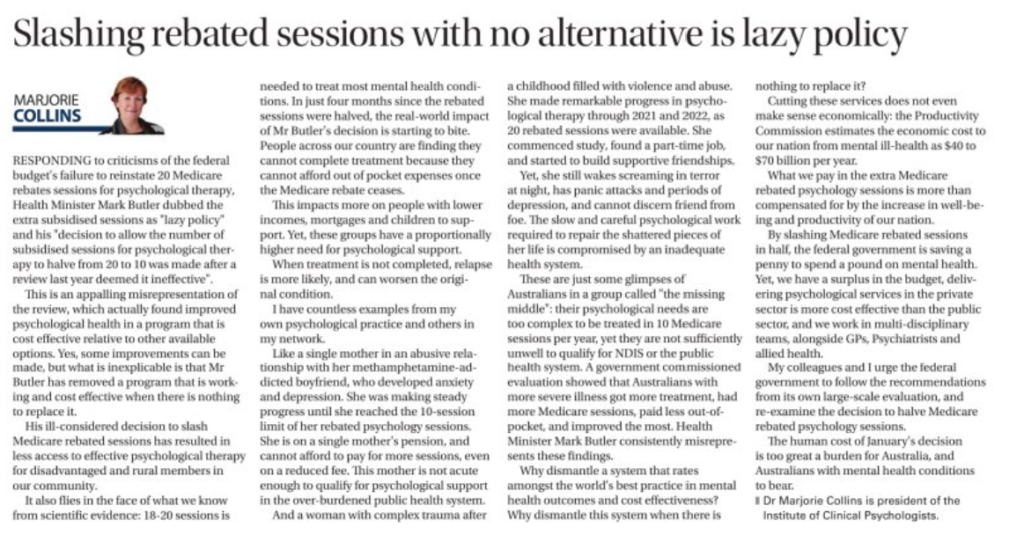Year: 2023
IN THE MEDIA: Highlights
Over the past 12 months, our President Dr Marjorie Collins has done an amazing job at getting the voice of Clinical Psychology into the Media around the country. Below is a snapshot of just some of the media outlets she has featured in.

More recent media activity:
On 9 May 2023, Marjorie attended a busy #MeetTheMedia event designed to induct attendees to ‘what the media want’. This ticket was free, as premium members of Media Stable.
This is billed as Australia’s leading media introduction event, designed to bring the decision-makers of media together with the experts and leaders of industry to better understand each other. I met Senior Producers, Editors, Chiefs of Staff, Presenters, and Journalists who are the gatekeepers of their mediums, learning what they look for in a story, how best to pitch a story, the preferred way to contact desired media, what the media expect from us and what to expect from the media. This event helped to build some authentic relationships with the media.

Joint ICP and ACPA MEDIA RELEASE: Psychology collaboration will help ease ADHD diagnosis bottleneck. This media release generated several radio interviews across the nation for ICP’s president and an article in The Australian.
Joint ICP, ACPA and Lived Experience Media Release: Call to end silence on Medicare July 24 2023
The Australian: Warning on ADHD online quiz assessment (featuring Marjorie Collins and Derek Cohen) July 18, 2023
ICP President, Marjorie Collins, has been busy with media engagement including:
- Appearing on Channel 9’s news afternoon and evening bulletins discussing Burnout.
- Canberra Times 18 May 2023: Slashing rebated sessions with no alternative is lazy policy.
- Radio interview on 6PR 15 May 2023: Psychologists hit back at health minister calling psychology rebates ‘lazy’.
Upcoming: Marjorie has been invited to an exclusive event, ‘a Night with the Media’.

MEDIA RELEASE Psychology collaboration will help ease ADHD diagnosis bottleneck


Joint release from the Institute of Clinical Psychologists (ICP) and Australian Clinical Psychology Association (ACPA)
With lengthening waiting lists for specialist assessment of Attention Deficit Hyperactivity Disorder (ADHD) the Royal Australian College of General Practitioners (RACGP) believes GPs should be permitted to diagnose and initiate medications for ADHD. But as the burden on GPs escalates, patients are finding it increasingly difficult to get a GP appointment. Is adding diagnosis and initiating treatment of ADHD patients, who can present with complexities in both diagnosis and management, a sensible solution?
The Institute of Clinical Psychologists (ICP) and Australian Clinical Psychology Association (ACPA) warn that this solution goes against guidelines set by Australia’s peak ADHD treatment body, the Australian ADHD Professionals Association (AADPA).
AADPA’s guidelines recommend a multidisciplinary approach and “a thorough assessment by an appropriately trained and credentialled clinician is needed to make a diagnosis of ADHD”. This is necessary as ADHD commonly co-occurs with learning disabilities or substance misuse and must be differentiated from conditions such as anxiety, developmental trauma, brain injury or PTSD, not to mention some medical conditions.
The bottleneck in diagnosis and treatment comes from overemphasising the medical treatment of ADHD. Yet, medical treatment is not always warranted. AADPA advocates an approach which includes family training and cognitive-behavioural therapy to improve level of function.
The bottleneck in access to psychiatrists and paediatricians for assessment and treatment of ADHD can be eased by psychologists who have completed specialised postgraduate training and developed skills to diagnose ADHD and provide psychosocial treatments to assist in management.
“Clinical Psychologists, Neuropsychologists and Developmental Psychologists have the capacity and appropriate training to diagnose and to manage people with ADHD, co-jointly with medical specialists, easing the burden on their medical colleagues,” President of the Institute of Clinical Psychologists Dr Marjorie Collins said.
“Medication should not be seen as the only treatment option for ADHD, particularly in children where educational and psychological co-morbidities need to be assessed and managed.”
President of the Australian Clinical Psychology Association Dr Caroline Hunt added that further collaboration within the medical profession will help to ease the bottleneck.
“We believe a more practical, efficient and accurate way to diagnose and develop treatment plans for people with ADHD is for Psychiatrists and Paediatricians to collaborate more closely with Clinical Psychologists, Neuropsychologists and Developmental Psychologists in working with this group,” she said.
ACPA and ICP are calling for greater use of specialised psychologists to diagnose and initiate multi-disciplinary treatment of people with suspected ADHD as the health system tries to address lengthening waiting lists for specialist assessment of ADHD by psychiatrists and paediatricians.
Dr Marjorie Collins, President of the Institute of Clinical Psychologists
Email: president@icp.org.au
Professor Caroline Hunt, President, of the Australian Clinical Psychology Association (ACPA)
Email: caroline.hunt@sydney.edu.au
ICP in the Media 2022/23
Over the past 12 months our President Dr Marjorie Collins has done an amazing job at getting the voice of Clinical Psychology into the Media around the country. Below is a snapshot of some of the media outlets she has featured in.

ICP in the Media: Canberra Times 18 May 2023

